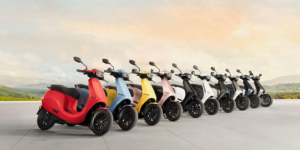Hello Reader,
The bears are at it again.
Domestic markets reflected global sentiments, falling sharply at the end of Monday. While the BSE Sensex fell over 827 points, closing at under 59,000, the Nifty50 dropped by more than 267 points, ending the day at just over 17,490 points.
Meanwhile, a new debate is afoot. Two weeks ago, foodtech giant Swiggy announced it will allow employees to moonlight, i.e., pursue side gigs or even a second job. And while the jury is still out on the benefits of moonlighting, Wipro Chairman Rishad Premji tweeted, labelling it as “cheating.”
ICYMI: Have a look-see inside this restaurant in San Francisco run completely by robots.
In today’s newsletter, we will talk about
- Lendingkart’s co-lending strategy
- Blockchain to digitise documents
- Solving last-mile hurdles for SMEs
Here’s your trivia for today: Which was the first commercially available Android device?
Fintech
Lendingkart’s co-lending strategy
For the past three years, MSME lending platform Lendingkart has been transitioning from providing short-term loans through its NBFC arm to co-lending by partnering with financial institutions.
“During October-November 2021, we were doing almost 30-40% of our business around co-lending, and now, almost 90% of the business goes into the same. This year, we will be disbursing over Rs 4,000 crore worth of loans,” says CEO and Co-founder Harshvardhan Lunia.
A new core focus:
- Lendingkart has 16 active partners, including private sector banks and NBFCs, and seven more are in the works.
- Co-lending forms 40% of its assets under management.
- The company recorded its third straight profitable quarter; earned Rs 50 crore profit in FY22.
Fintech
Digitising and verifying documents
For economically challenged tribals living in Maharashtra’s Gadchiroli district, government certificates and documents are paramount to avail benefits.
Enter LegitDoc, a blockchain-based app that helps issue tamper-proof digital documents to stakeholders that be verified from anywhere around the world, within seconds.
On the chain:
- LegitDoc is deployed on public blockchains such as Ethereum and Polygon.
- dApp generates a unique QR code consisting of blockchain proofs embedded on caste certificates with digital fingerprints.
- The Maharashtra government partnered with blockchain startup Print2Block to issue certificates.
Startup
Solving last-mile hurdles for SMEs
For small and medium enterprises (SMEs), smooth last-mile logistics are paramount. After all, SMEs need a seamless movement of their goods to survive and thrive.
Enter Uncle Delivery, which is powering SMEs with an app that employs AI and on-ground market surveillance to connect users with on-demand businesses.
Logistics web:
- Launched by Sourabh Chatterjee, the startup has a driver base of over 86,000 drivers and an active user base of near 24,000 users.
- It operates in Bengaluru, Mumbai, Delhi, and Hyderabad and employs nearly 235 people.
- The startup offers users services across two-wheelers, three-wheelers, and trucks.
Uncle Delivery Core team
News & updates
- Time for a reset: Toyota is rebooting its strategy for India, doubling down on a bet that emerging markets will learn to love its hybrids, as long as the price is right. It is teaming up with Suzuki to crack the Indian hybrid market.
- Scaling back: Alibaba and Tencent executives are focusing on cutting costs across the business from headcount to exiting non-core businesses. It comes after both companies posted a set of second-quarter results that confirmed these behemoths are not growing anymore.
- In the red: US and European stocks slid on Monday as the outlook for large global economies darkened and investors braced themselves for a central bank summit. The growing sense of economic gloom comes ahead of the Federal Reserve’s annual gathering in Wyoming.
- Potential deal: Amazon is among the bidders for healthcare company Signify Health Inc., joining other heavy hitters vying in an auction for the home-health-services provider. Signify is for sale in an auction that could value it at more than $8 billion.
Which was the first commercially available Android device?
Answer: HTC Dream, announced in September 2008.
We would love to hear from you! To let us know what you liked and disliked about our newsletter, please mail editorial@yourstory.com.
If you don’t already get this newsletter in your inbox, sign up here. For past editions of the YourStory Buzz, you can check our Daily Capsule page here.


![Read more about the article [Funding Alert] Orange Health raises $25M from Bertelsmann India Investments, others](https://blog.digitalsevaa.com/wp-content/uploads/2022/06/Imagefl6t-1654064962080-300x150.jpg)







